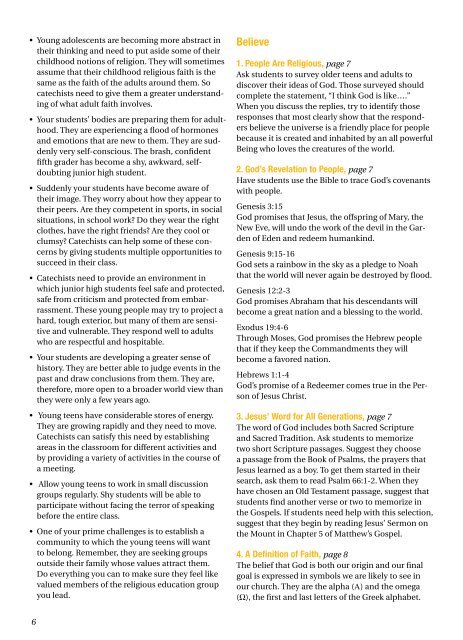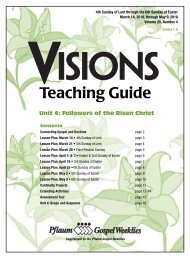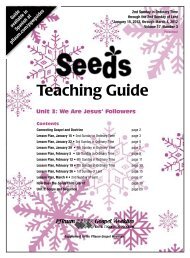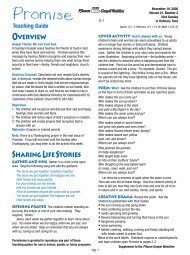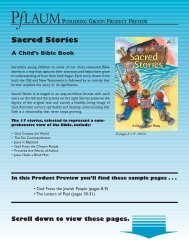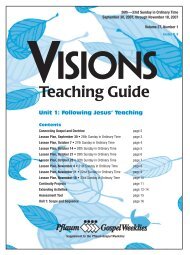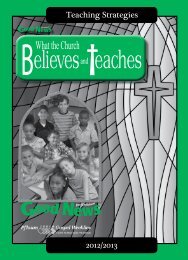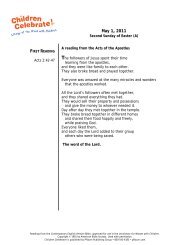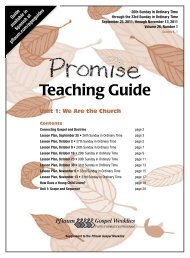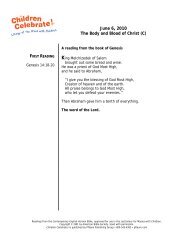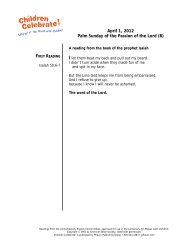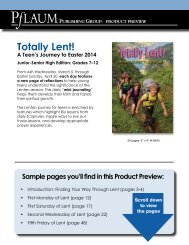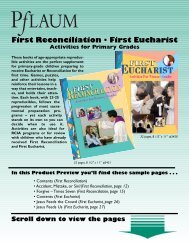What the Church Believes and Teaches - Pflaum Gospel Weeklies
What the Church Believes and Teaches - Pflaum Gospel Weeklies
What the Church Believes and Teaches - Pflaum Gospel Weeklies
Create successful ePaper yourself
Turn your PDF publications into a flip-book with our unique Google optimized e-Paper software.
• Young adolescents are becoming more abstract in<br />
<strong>the</strong>ir thinking <strong>and</strong> need to put aside some of <strong>the</strong>ir<br />
childhood notions of religion. They will sometimes<br />
assume that <strong>the</strong>ir childhood religious faith is <strong>the</strong><br />
same as <strong>the</strong> faith of <strong>the</strong> adults around <strong>the</strong>m. So<br />
catechists need to give <strong>the</strong>m a greater underst<strong>and</strong>ing<br />
of what adult faith involves.<br />
• Your students’ bodies are preparing <strong>the</strong>m for adulthood.<br />
They are experiencing a flood of hormones<br />
<strong>and</strong> emotions that are new to <strong>the</strong>m. They are suddenly<br />
very self-conscious. The brash, confident<br />
fifth grader has become a shy, awkward, selfdoubting<br />
junior high student.<br />
• Suddenly your students have become aware of<br />
<strong>the</strong>ir image. They worry about how <strong>the</strong>y appear to<br />
<strong>the</strong>ir peers. Are <strong>the</strong>y competent in sports, in social<br />
situations, in school work? Do <strong>the</strong>y wear <strong>the</strong> right<br />
clo<strong>the</strong>s, have <strong>the</strong> right friends? Are <strong>the</strong>y cool or<br />
clumsy? Catechists can help some of <strong>the</strong>se concerns<br />
by giving students multiple opportunities to<br />
succeed in <strong>the</strong>ir class.<br />
• Catechists need to provide an environment in<br />
which junior high students feel safe <strong>and</strong> protected,<br />
safe from criticism <strong>and</strong> protected from embarrassment.<br />
These young people may try to project a<br />
hard, tough exterior, but many of <strong>the</strong>m are sensitive<br />
<strong>and</strong> vulnerable. They respond well to adults<br />
who are respectful <strong>and</strong> hospitable.<br />
• Your students are developing a greater sense of<br />
history. They are better able to judge events in <strong>the</strong><br />
past <strong>and</strong> draw conclusions from <strong>the</strong>m. They are,<br />
<strong>the</strong>refore, more open to a broader world view than<br />
<strong>the</strong>y were only a few years ago.<br />
• Young teens have considerable stores of energy.<br />
They are growing rapidly <strong>and</strong> <strong>the</strong>y need to move.<br />
Catechists can satisfy this need by establishing<br />
areas in <strong>the</strong> classroom for different activities <strong>and</strong><br />
by providing a variety of activities in <strong>the</strong> course of<br />
a meeting.<br />
• Allow young teens to work in small discussion<br />
groups regularly. Shy students will be able to<br />
participate without facing <strong>the</strong> terror of speaking<br />
before <strong>the</strong> entire class.<br />
• One of your prime challenges is to establish a<br />
community to which <strong>the</strong> young teens will want<br />
to belong. Remember, <strong>the</strong>y are seeking groups<br />
outside <strong>the</strong>ir family whose values attract <strong>the</strong>m.<br />
Do everything you can to make sure <strong>the</strong>y feel like<br />
valued members of <strong>the</strong> religious education group<br />
you lead.<br />
Believe<br />
1. People Are Religious, page 7<br />
Ask students to survey older teens <strong>and</strong> adults to<br />
discover <strong>the</strong>ir ideas of God. Those surveyed should<br />
complete <strong>the</strong> statement, “I think God is like….”<br />
When you discuss <strong>the</strong> replies, try to identify those<br />
responses that most clearly show that <strong>the</strong> responders<br />
believe <strong>the</strong> universe is a friendly place for people<br />
because it is created <strong>and</strong> inhabited by an all powerful<br />
Being who loves <strong>the</strong> creatures of <strong>the</strong> world.<br />
2. God’s Revelation to People, page 7<br />
Have students use <strong>the</strong> Bible to trace God’s covenants<br />
with people.<br />
Genesis 3:15<br />
God promises that Jesus, <strong>the</strong> offspring of Mary, <strong>the</strong><br />
New Eve, will undo <strong>the</strong> work of <strong>the</strong> devil in <strong>the</strong> Garden<br />
of Eden <strong>and</strong> redeem humankind.<br />
Genesis 9:15-16<br />
God sets a rainbow in <strong>the</strong> sky as a pledge to Noah<br />
that <strong>the</strong> world will never again be destroyed by flood.<br />
Genesis 12:2-3<br />
God promises Abraham that his descendants will<br />
become a great nation <strong>and</strong> a blessing to <strong>the</strong> world.<br />
Exodus 19:4-6<br />
Through Moses, God promises <strong>the</strong> Hebrew people<br />
that if <strong>the</strong>y keep <strong>the</strong> Comm<strong>and</strong>ments <strong>the</strong>y will<br />
become a favored nation.<br />
Hebrews 1:1-4<br />
God’s promise of a Redeemer comes true in <strong>the</strong> Person<br />
of Jesus Christ.<br />
3. Jesus’ Word for All Generations, page 7<br />
The word of God includes both Sacred Scripture<br />
<strong>and</strong> Sacred Tradition. Ask students to memorize<br />
two short Scripture passages. Suggest <strong>the</strong>y choose<br />
a passage from <strong>the</strong> Book of Psalms, <strong>the</strong> prayers that<br />
Jesus learned as a boy. To get <strong>the</strong>m started in <strong>the</strong>ir<br />
search, ask <strong>the</strong>m to read Psalm 66:1-2. When <strong>the</strong>y<br />
have chosen an Old Testament passage, suggest that<br />
students find ano<strong>the</strong>r verse or two to memorize in<br />
<strong>the</strong> <strong>Gospel</strong>s. If students need help with this selection,<br />
suggest that <strong>the</strong>y begin by reading Jesus’ Sermon on<br />
<strong>the</strong> Mount in Chapter 5 of Mat<strong>the</strong>w’s <strong>Gospel</strong>.<br />
4. A Definition of Faith, page 8<br />
The belief that God is both our origin <strong>and</strong> our final<br />
goal is expressed in symbols we are likely to see in<br />
our church. They are <strong>the</strong> alpha (A) <strong>and</strong> <strong>the</strong> omega<br />
(Ω), <strong>the</strong> first <strong>and</strong> last letters of <strong>the</strong> Greek alphabet.<br />
6


